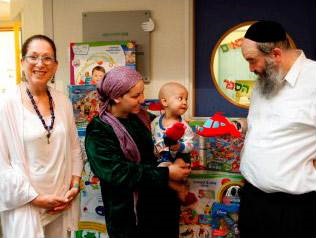
Conflict and tension are never far from the doors of Hadassah, but the hospital has managed to keep the reality of the streets from crossing its threshold.
A recent seminar hosted by the Hadassah School* focused on the multicultural profile of the hospital’s staff and patients.
The following report was written by Melbourne psychologist, Esther Takac, who attended the seminar in May.
Hadassah recently held a ground-breaking professional development seminar ‘Multiculturalism in the Pediatric Setting’. The seminar was attended by education and medical professionals.
The multicultural reality of Hadassah is that hospitalized children come from a range of cultural and religious backgrounds, be they Jewish, Muslim and Christian, who identify as Israeli or Palestinian. The same is true of hospital staff who also support a range of political beliefs. In the world outside of the hospital many of these communities experience tension and conflict.
Once in the hospital the children learn to cope not only with a challenging medical world, but with people who speak different languages and have different cultural norms. The school has made it a goal to strengthen this cross-cultural understanding and allow children to discover that here is a rare opportunity for new experiences and friendships. There is an opportunity, a window, to break down stereotypes and prejudices.
Edna Pinchover, the school’s director said, “The children at Hadassah didn’t choose to attend a multicultural school, but once they’re here, they have a positive, multicultural experience that they and their families will not forget. We believe that our educational-therapeutic work plants seeds of hope and friendship among the many cultures in our land.”
I have worked with Edna and seen her deep commitment to an ethical and democratic environment in the school and hospital and her respectful and accepting approach to all patients and staff.
To develop this successful multicultural atmosphere, the school has been providing professional development to staff over a number of years. Last year ago the school formalized an ethical code, which provides a model for dealing with multicultural dilemmas.
The recent seminar focused on the principles of democratic thinking, which strengthen respectful and cooperative behavior with people, whose beliefs and values may be different from one’s own. These principles help professionals to think clearly and ethically about daily dilemmas that arise. Recent dilemmas have included a Jewish family who refused to receive treatment from an Arab nurse, another who do not want their child to be taught be an Arab teacher, and a Moslem boy who bragged on the ward about throwing stones at Jewish Israelis.
The seminar included lectures and workshops by academics and experts in multiculturalism from a variety of fields, including music, theatre and the visual arts. An understanding of Judaism’s contribution to democratic and ethical thinking was included. In this context sensitive multicultural themes, which many dare not touch on a day-to-day basis, were explored. The seminar focused on delving deeper into one another’s cultures, finding common values and bases of respect, and using these new understandings to better respond to multi-cultural conflicts that arise within the hospital.
It is hoped that the collective experience of educators and medical professionals learning and sharing side by side will result in improved communication with, and support of, the families treated at Hadassah.
